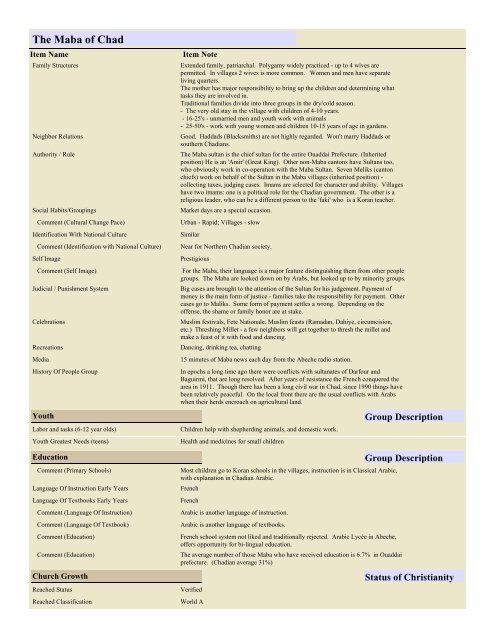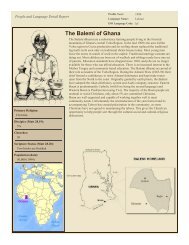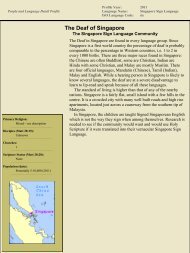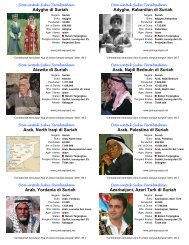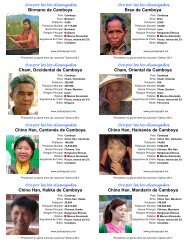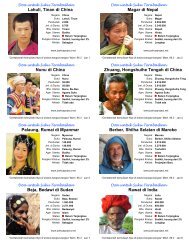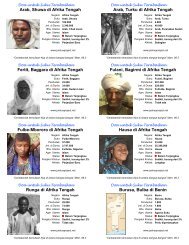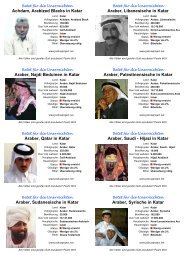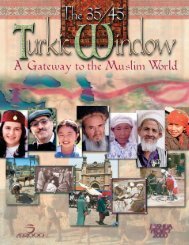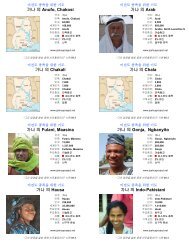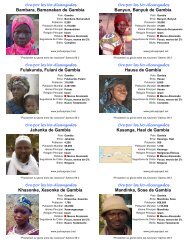expanded PDF profile - Joshua Project
expanded PDF profile - Joshua Project
expanded PDF profile - Joshua Project
You also want an ePaper? Increase the reach of your titles
YUMPU automatically turns print PDFs into web optimized ePapers that Google loves.
The Maba of Chad<br />
Item Name<br />
Family Structures<br />
Neighbor Relations<br />
Authority / Rule<br />
Social Habits/Groupings<br />
Comment (Cultural Change Pace)<br />
Identification With National Culture<br />
Comment (Identification with National Culture)<br />
Self Image<br />
Item Note<br />
Extended family, patriarchal. Polygamy widely practiced - up to 4 wives are<br />
permitted. In villages 2 wives is more common. Women and men have separate<br />
living quarters.<br />
The mother has major responsibility to bring up the children and determining what<br />
tasks they are involved in.<br />
Traditional families divide into three groups in the dry/cold season.<br />
- The very old stay in the village with children of 4-10 years.<br />
- 16-25's - unmarried men and youth work with animals<br />
- 25-50's - work with young women and children 10-15 years of age in gardens.<br />
Good. Haddads (Blacksmiths) are not highly regarded. Won't marry Haddads or<br />
southern Chadians.<br />
The Maba sultan is the chief sultan for the entire Ouaddai Prefecture. (Inherited<br />
position) He is an 'Amir' (Great King). Other non-Maba cantons have Sultans too,<br />
who obviously work in co-operation with the Maba Sultan. Seven Meliks (canton<br />
chiefs) work on behalf of the Sultan in the Maba villages (inherited position) -<br />
collecting taxes, judging cases. Imams are selected for character and ability. Villages<br />
have two imams: one is a political role for the Chadian government. The other is a<br />
religious leader, who can be a different person to the 'faki' who is a Koran teacher.<br />
Market days are a special occasion.<br />
Urban - Rapid; Villages - slow<br />
Similar<br />
Near for Northern Chadian society.<br />
Prestigious<br />
Comment (Self Image) For the Maba, their language is a major feature distinguishing them from other people<br />
groups. The Maba are looked down on by Arabs, but looked up to by minority groups.<br />
Judicial / Punishment System<br />
Big cases are brought to the attention of the Sultan for his judgement. Payment of<br />
money is the main form of justice - families take the responsibility for payment. Other<br />
cases go to Maliks. Some form of payment settles a wrong. Depending on the<br />
offense, the shame or family honor are at stake.<br />
Celebrations<br />
Muslim festivals, Fete Nationale, Muslim feasts (Ramadan, Dahiye, circumcision,<br />
etc.) Threshing Millet - a few neighbors will get together to thresh the millet and<br />
make a feast of it with food and dancing.<br />
Recreations<br />
Media<br />
History Of People Group<br />
Youth<br />
Labor and tasks (6-12 year olds)<br />
Youth Greatest Needs (teens)<br />
Dancing, drinking tea, chatting<br />
15 minutes of Maba news each day from the Abeche radio station.<br />
In epochs a long time ago there were conflicts with sultanates of Darfour and<br />
Baguirmi, that are long resolved. After years of resistance the French conquered the<br />
area in 1911. Though there has been a long civil war in Chad, since 1990 things have<br />
been relatively peaceful. On the local front there are the usual conflicts with Arabs<br />
when their herds encroach on agricultural land.<br />
Children help with shepherding animals, and domestic work.<br />
Health and medicines for small children<br />
Group Description<br />
Education<br />
Comment (Primary Schools)<br />
Language Of Instruction Early Years<br />
Language Of Textbooks Early Years<br />
Comment (Language Of Instruction)<br />
Comment (Language Of Textbook)<br />
Comment (Education)<br />
Comment (Education)<br />
Church Growth<br />
Reached Status<br />
Reached Classification<br />
Most children go to Koran schools in the villages, instruction is in Classical Arabic,<br />
with explanation in Chadian Arabic.<br />
French<br />
French<br />
Arabic is another language of instruction.<br />
Arabic is another language of textbooks.<br />
French school system not liked and traditionally rejected. Arabic Lycée in Abeche,<br />
offers opportunity for bi-lingual education.<br />
The average number of those Maba who have received education is 6.7% in Ouaddai<br />
prefecture. (Chadian average 31%)<br />
Verified<br />
World A<br />
Group Description<br />
Status of Christianity


